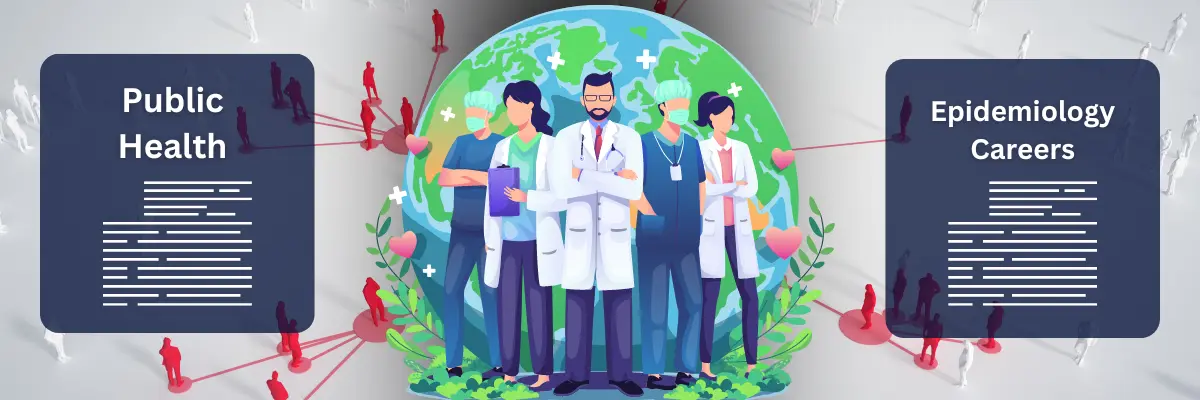08 Jul 2024 | Public Health and Epidemiology Careers in Foreign Countries
0
573
Introduction to Public Health and Epidemiology Careers
The field of public health and epidemiology in the current, interconnected global village avails great opportunities for career minded heroes. Masters in public health are involved in a wide range of activities ranging from fighting diseases within communities to pursuing healthy lifestyles within communities, and they offer some of the most fulfilling as well as socially relevant jobs.
Why Choose a Career in Public Health and Epidemiology?
Global Impact: The community health staff consists of highly skilled individuals who work towards bridging the gap of health inequalities and enhancing healthcare organizations throughout the world.
Diverse Roles: Possible careers in this field include research, formulation of policies, disease surveillance, promotion of health and support in international health affairs.
Career Growth: Given globalization and the changing world heath landscape, Human Resources is in great demand in international organizations, not-for-profit organizations, governments, and educational institutions.
Opportunities in Foreign Countries
Job Opportunities
Public health and epidemiology careers abroad offer a wide range of roles tailored to different skill sets and interests:
Epidemiologist: Investigate the distribution and prevalence of diseases, monitor diseases, and collect, analyze and interpret data so as to inform the development of disease control measures.
Health Policy Analyst: Influence the development of public health policies and strategies at country and global level, affecting healthcare and resources.
Global Health Consultant: Technical assistance and consultancy to international health institutions and ministries of health, supporting international and national health programs and strengthening health systems.
Skills Required
To excel in public health and epidemiology careers abroad, professionals should possess a combination of technical expertise and soft skills:
Analytical Skills: The use of health information, analysis of statistical data, and making conclusions that can help improve population’s health.
Communication Skills: Exchange of information with the policy makers, health care professionals, communities, and our partners across the world.
Cultural Competency: Appreciation of cultural differences and global health trends to develop culturally appropriate health interventions and policies.
Education and Training
It is imperative to secure a stable job in any field to establish a stable base for graduating into the profession of public health and epidemiology in another country. Most of the jobs require a bachelor’s degree in public health or epidemiology in some cases other related field. Professional positions may call for a minimum of a master of public health degree or its equivalent (MPH, MSc in Epidemiology or other related specialty) or major area of interest such as international health, health economics, policy, biostatistics and the likes. Other related certifications and training found within the field are other advanced professional development courses in data analysis and program evaluation for instance.
Top Countries for Public Health Careers
When considering a career in public health and epidemiology abroad, several countries stand out as leading destinations for professionals:
United States: Several universities, academic medical centers, health departments and agencies like CDC, NIH, and WHO are based in Atlanta providing ample opportunities in multiple subfields of public health.
United Kingdom: A center for research, policy analysis and practice intervention in the field of international health with employment prospects in university and academic institution, public health organizations such as public health England, and numerous international non-governmental organizations including Save the Children and Oxfam.
Switzerland: Accommodates several prominent global health intergovernmental bodies including the World Health Organization (WHO), Joint United Nations Program on HIV and AIDS (UNAIDS), and International Committee of the Red Cross (ICRC) which offer positions in formulating health policies at the international level, providing humanitarian assistance, and conducting research in public health.
For more assistance please visit us Study abroad consultancy, and avail of our wide range of services for students on destinations like Study in USA, Study in UK, Study in Canada, Study in Australia, Study in ireland and many more country.
Frequently Asked Questions
1. What qualifications do I need for a career in public health abroad?
It is possible to enter the field with a master’s degree; however, a bachelor’s degree in public health, epidemiology or a related discipline is commonly expected for entry-level positions. Higher positions include leadership roles in each field, which requires at least a Master of Public Health or Master of Science degree or even a Doctor of Public Health degree, combined with certain years of work experience.
2. How can I find job opportunities in foreign countries?
Therefore, the job search methods include networking within a global health community, participating in the international conferences and workshops, and searching job postings in certain job boards that post positions available in public health and epidemiology sectors. Furthermore, networking through industry group memberships and alumni groups offer great potential for job listings.
3. What are the key skills employers look for in public health professionals?
Desired characteristics include quantitative and qualitative analytical skills and abilities; abilities to work with database and statistical analysis software including SAS and R; fluency in English and other languages as well as multicultural competencies; experience in developing and managing health programs and policies.
4. What is the salary range for public health careers abroad?
According to some factors which include place of work, working organization (government, NGO and private companies), experience, and position one is holding, salaries differ. Starting salaries are typically between $50,000 and a junior professional post may earn less than $100,000 while a senior post in a well established international organization can earn the professional well over $100,000.
5. How can studying abroad enhance my career in public health?
Studying abroad offers unique opportunities to gain firsthand experience in diverse healthcare systems, cultural practices, and global health challenges. It fosters cross-cultural understanding, expands professional networks, and provides access to cutting-edge research and training facilities, thereby enriching your career trajectory in public health and epidemiology.


